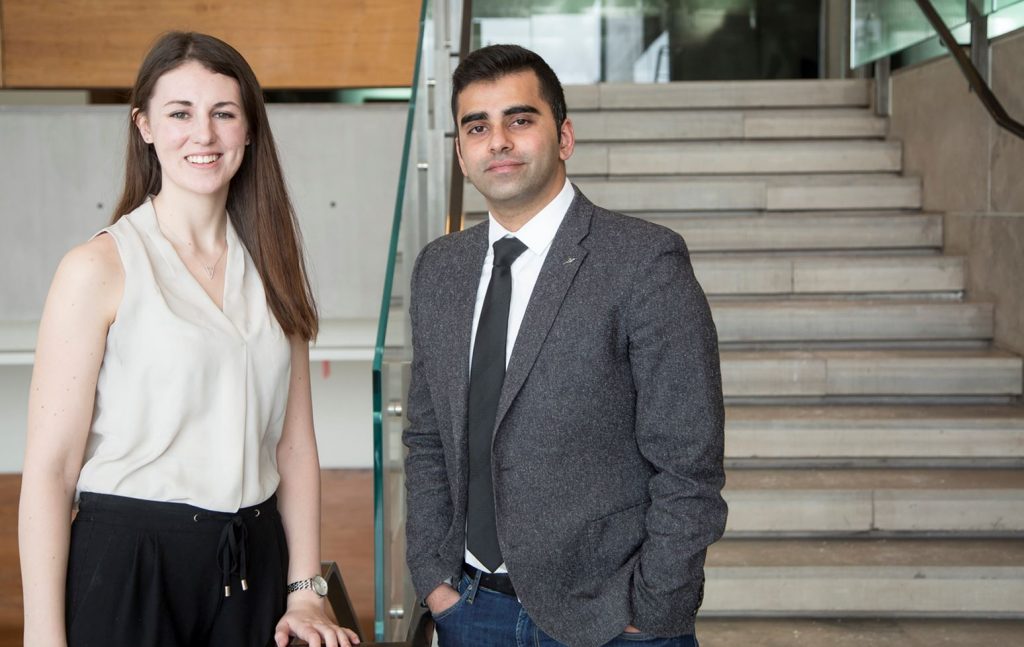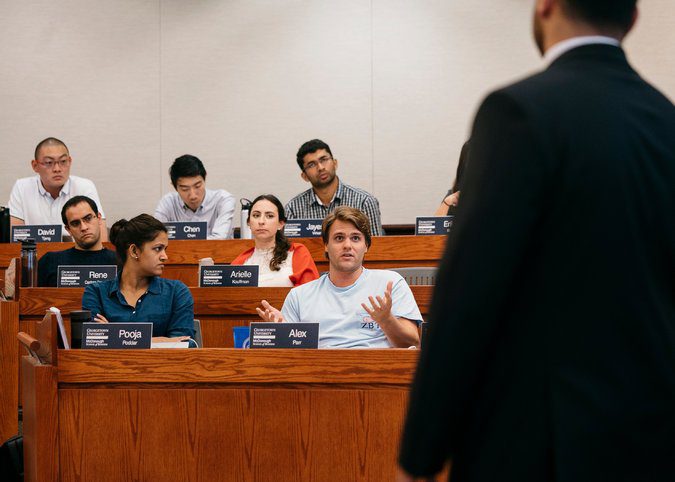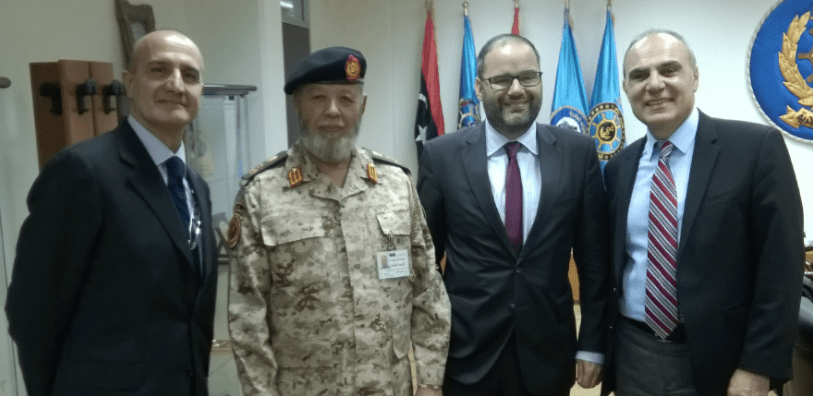Toronto News: Ivey Students Come to the UN, and More

Let’s visit some of the biggest news coming out of Toronto business schools this week.
François Neville Unpacks Why Some Minority Groups Won’t Seek Business Loans – DeGroote Communications Department
François Neville, Assistant Professor of Strategic Management at the DeGroote School of Business at McMaster University, recently investigated whether certain minority entrepreneurs become discouraged when it comes to entrepreneurial activities such as seeking capital. Neville’s has published a study in the Journal of Management Studies breaks down how years of mistreatment have led to many minority business owners not wanting to begin the process of seeking a loan.
“There is a fairly established body of research offering compelling evidence that minorities are subject to inequality in the workplace and entrepreneurship, despite numerous policy initiatives to curb this,” Neville told the school.
You can read more about Neville and the study here.
Ivey Students Participating in UN Conference – News@Ivey
Two Ivey Business School students were given the special opportunity to take part in a United Nations (UN) conference earlier this month. Emma Hogeterp, HBA/Huron Global Studies ’19; and Sanket Mehta, MBA ’18 , participating in the 2018 Winter Youth Assembly at the United Nations headquarters in New York City from Feb. 14-16.
“The purpose of the conference is to not only discuss ideas, but also how they can be applicable in your country,” said Mehta. “What works in one country might not work in another because every country has a different set of economic indicators, such as life expectancy, income levels, and population.”

Ivey Business School students Emma Hogeterp and Sanket Mehta / Photo via ivey.uwo.ca
Learn more about the Youth Assembly and the Ivey students attending the summit here.
Student Trading Competition Celebrates its 15th Anniversary at the University of Toronto’s Rotman School of Management – Rotman Media Centre
The Rotman School of Management is hosting the 15th annual Rotman International Trading Competition (RITC) from February 22 to 24 in the Rotman School’s BMO Financial Group Finance Research and Trading Lab. Teams from 52 different universities spanning the globe will participate in various activities including electronic and outcry trading cases, seminars with industry practitioners, and social events with their fellow competitors.
“Given the challenge associated with each competition case, participants build models to apply theory, process information to separate the signal from the noise, quantify uncertainty and manage risks. Teams who combine those skills with good decision making do the best over the weekend.” Prof. Tom McCurdy, the Bonham Chair in Finance and academic director of the lab and the competition, said.
You can read more about RITC here.
The Differences Between a Full-Time MBA in New York City and Toronto – MetroMBA
We stack up the best of the best when it comes to NYC and Toronto MBA programs, and where each city stands out. Not surprisingly, Toronto MBAs are more affordable, and the cost of living in the city is infinitely more reasonable, but NYC programs have more prestige and potential financial reward.
Even for those who do not pay extra for room and board, expenses for U.S. residents studying at many NYC business schools will be higher than their neighbors to the north. According to Numbeo, the cost of living in Toronto is 24 percent less than the cost of living in New York City, and rent is nearly 40 percent less.
However, the value of the individual school tends to favor New York City programs over its Toronto counterparts. NYU Stern is currently the 12th overall on the U.S. News & World Report 2018 ranking, with CBS coming even higher at 9th overall. The ranking comparison remains consistent with The Economist as well, with CBS coming in 9th (again), Stern coming in 14th. The highest ranked Canadian program in The Economist ranking—Ivey Business School—came in 59th.
Check out the rest of our comparison here.
Top Schools Tackle Sexual Harassment, NFL Protests, and More

Should business schools teach ethics and social responsibility? In the past, top MBA programs stuck to a fairly typical curriculum: finance, marketing, accounting, economics. And while those topics still comprise the core of most MBA programs, they’re now only a part of the whole.
Beyond allowing MBA students to focus their studies in areas like entrepreneurship or technology, MBA programs are also taking on some of the most prominent ethical topics of the day, asking students to weigh in on current headlines and happenings. It’s the MBA ethics debate.
According to a United Nations group survey of business school students from around the world, students believe that ethics are a business’s most important responsibility. According to the report, “the exposure to, and teaching of, business ethics does not merely assist business leaders to resolve moral dilemmas. More importantly, it matures their proficiency in moral judgment and their ability to incorporate social issues in the decision-making process and assists them in implementing this in an all-inclusive manner.”
For example, last year a group of business executives—including the CEO of PepsiCo and head of General Motors—got together to dissolve two business councils that consulted with President Trump after insensitive remarks about the white supremacist violence that took place in Charlottesville, VA. And other executives such as the CEO of Patagonia, Yvon Choinard, have been vocal about political and ethical issues—even using their companies to take positions on social responsibility that would typically be considered outside the scope of business.
So, it’s no wonder many business schools have been making business ethics a more important part of their curriculum. The question is, “How should business ethics be added to the MBA curriculum, and how is it being added currently?” It depends on the school.
At Georgetown University’s McDonough School of Business, Professor Edward Soule teaches courses on business ethics, corporate social responsibility, and leadership. During these classes, he told the New York Times that he has assigned coursework covering a range of trending topics including sexual harassment at Uber, social justice protests by N.F.L. players, and how companies like Amazon have responded when attacked by President Trump.
“Something has changed,” Soule said. “I would be kidding you if I told you there wasn’t a different vibe in the classroom. Ethics and values have taken on more significance. It has to do with all of the things going on in this administration, often things that challenge our understanding of ethics and leadership.”

Students discuss the recent NFL protests in Prof. Ed Soule’s class at Georgetown’s McDonough School of Business. Photo via Justin T. Gellerson for The New York Times.
Georgetown McDonough is also home to the Institute for the Study of Markets and Ethics (GISME), a center that examines the ethical issues inherent in the functioning of a market society. Students, faculty, and researchers who participate in the center explore ethical questions as they relate to business and bring ethical considerations to bear on policy decisions regarding the regulation of markets. These are especially salient issues for Georgetown McDonough given its Washington D.C. location.
“At the McDonough School of Business, we have developed a method of teaching business ethics that includes normative experiential learning, communicates in terms readily understood by business students, and involves actual ethical decision-making on the part of the students,” Michael Douma, assistant research professor and director of GISME, said in a news release. “We have found that our approach results in students being more invested in the course and more committed to resolving ethical issues that confront them in a business environment.”
Another example can be found at Carnegie Mellon’s Tepper School of Business. According to John Hooker, a professor of operations research and business ethics and social responsibility, ethics has been a part of the Tepper School curriculum since the 1990s. “Our program was apparently the first to introduce the topic (1966), as part of a course on business law,” Hooker told us. “The ethics presence has gradually increased over the years, but we ethics faculty often have to fight for it. My view is that a required ethics course should be part of the picture.”
And Leanne Meyer, co-director of the Accelerate Leadership Center at the school, told the New York Times, “There’s a turning point in what’s expected from business leaders. Up until now, business leaders were largely responsible for delivering products. Now, shareholders are looking to corporate leaders to make statements on what would traditionally have been social justice or moral issues.”
As for ethics and MBA students, Tepper’s core offering in Ethics and Leadership is one of the only second-year courses it requires its students to take. The course teaches students how to foster their ability to reason and how to handle the ethical implications of managing organizations and people.
“The basic lesson for MBA students is that business ethics is not optional,” explained Hooker. “It is the basis for the social infrastructure that makes business possible, much as engineering is the basis for physical infrastructure. It requires careful analysis and training, no less than engineering or finance. This is why we need a stand-alone ethics course. Business ethics training teaches us to do ethics with our brains rather than rely on gut feelings. Otherwise, we have no way to reach consensus on the ground rules.”
In the end, there are many options for MBA students interested in ethics, though ultimately it up to the students themselves to raise topics that are pressing to them. “Ethics courses often focus on the hot topics. This stimulates discussion and raises course ratings, but it generates more heat than light,” said Hooker. “I focus on issues that students themselves raise. I also emphasize cross-cultural ethics, because business is global, and norms vary enormously around in the world. U.S. students typically have little awareness of this.”
Whether through case studies, guest speakers, simulations, competitions, or another initiative, the leading MBA programs dive into business ethics and corporate responsibility using a range of approaches. To learn more about Professor Hooker’s approach to ethics, you can check out his blog: Ethical Decisions.
This article has been edited and republished from our sister site, Clear Admit
Beyond Business School: Meet the Cambridge EMBA Who Is Rebuilding Libya

As an Executive MBA (EMBA) student, you don’t have to choose between your career and your studies, which was exactly the case for Roland Friedrich, who worked as a senior political affairs officer for the United Nations while pursuing his EMBA at Cambridge Judge Business School. Friedrich graduated with his EMBA in 2016, but through his studies he was involved in the rebuilding of Libya as part of the United Nations Support Mission in Libya (UNSMIL). This mission, established in 2011, supports the country’s transitional authorities and institutions after the overthrow of Colonel Gaddafi.
Of his role, Friedrich said in a Cambridge Judge blog: “42 years of authoritarian rule left behind weak institutions, multiple factions, and militias vying for influence and an abundance of weapons. Six years after the 2011 revolution, the country faces a prolonged political, security and—more recently—economic crisis. The challenges range from terrorism and organized crime and deteriorating living conditions to political polarization and fragmenting institutions.”
As for how he got involved in Libya, it started with a career in the German armed forces where he focused on conflict management, security sector reform, and Middle Eastern affairs. From there, Friedrich spent eight years at the Geneva Centre for the Democratic Control of Armed Forces as a security sector reform advisor. After that, he joined the UN to work directly with Libya.
Over the course of his work, Friedrich has been involved in some incredible initiatives, including ceasefire negotiations between the ‘Libya Dawn’ and ‘Dignity’ militias, negotiating the Libyan Political Agreement, and advising the Special Representative of the UN Secretary-General for Libya on the mission’s policies in the region.

Friedrich (EMBA ’16) pictured third from left. Image via Cambridge Judge website.
“[This work] requires a thorough understanding of the local players and their motivations, a clear vision of what you want to achieve, and lots of creativity and flexibility when facilitating a deal,” he wrote. “There are quite some shared aspects here with strategy development and negotiations in the business world.”
And it was these “shared aspects” that made an EMBA at Cambridge Judge such a good idea. In his work, particularly dealing with the balance of power between nations, Friedrich found that understanding the latest management approaches was a great way to enhance his work in mediation and strategy.
“Cooperation between the UN and the private sector is picking up sharply, not only in the humanitarian and development fields but also in peace and security,” Friedrich explained. “The EMBA helps me get on top of the latest management concepts and practices. It also helps me develop a thorough understanding of strategic management and organizational behavior—issues that have always fascinated me and that are of direct relevance to my work.”
For a full account Roland Friedrich’s experience as a UN officer and EMBA student, check out the blog on the school website.
This article has been edited and republished with permissions from Clear Admit.
Getting Paid: Highest MBA Salaries in San Francisco

San Franciso means many things to many people. Equal parts counter-cultural mecca, ground zero tech hub, haven for diversity, and real estate development nightmare, SF conjures images of Silicon Valley introverts and Haight-Ashbury hippies, as well as the high-earning Facebook employees who displace them.
The Best Los Angeles Global MBA Programs

Globalization is a foregone conclusion in the business world. Emerging markets overseas are gaining economic momentum and cultural fluency of international issues are becoming increasingly essential for business leaders. MBA students and graduates who ignore the undeniable shift toward interconnected markets may be left behind in today’s globalized world.
Spotlight: LBS MBA Alum Tony Wheeler

If you could travel anywhere in the world, where would you go? It’s a tough question, but if anyone would have suggestions, it would be Tony Wheeler, a London Business School MBA alumnus and the co-founder of Lonely Planet Publications—the world’s largest travel guidebook publisher.
This January, Tony and Maureen Wheeler received the 13th UNWTO (United Nations World Tourism Organization) Lifetime Achievement Award—a prize conferred every year to individuals with visionary leadership and significant contributions to the global tourism sector. For over 40 years, Wheeler has played an inspirational role for worldwide travelers, writers, and the tourism sector through Lonely Planet Publications. Continue reading…
